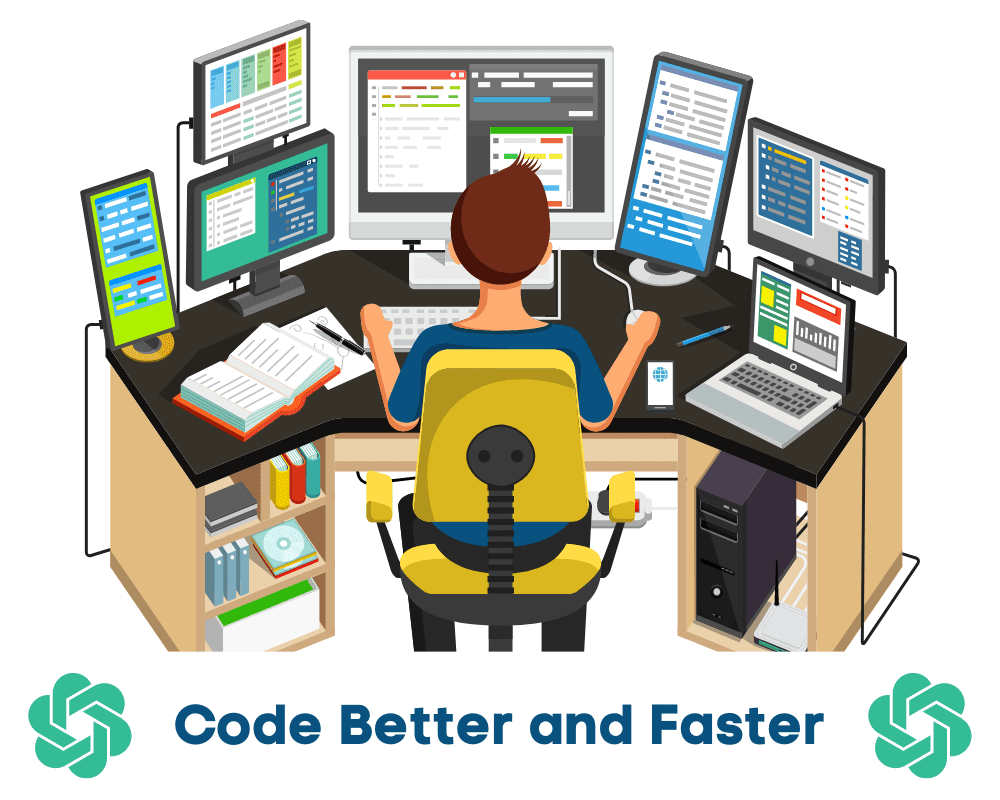7 Ways ChatGPT Makes You Code Better and Faster
From project planning to producing production-ready code, ChatGPT is your trusty companion throughout the entire development process, offering valuable assistance every step of the way.

Image by Author
I'm excited to share with you seven awesome ways that have personally helped me become a better and faster coder, all thanks to ChatGPT! These fantastic tips will not only help you avoid common mistakes but also reveal the incredible capabilities of having an AI copilot by your side in the coding journey. So, let's dive in and supercharge your coding skills together!
1. Project Planning
Project planning is the most important phase of any venture where you lay the foundation for success. Getting ChatGPT's assistance during the planning stage can be invaluable as it can help you think through the overall scope, architecture, requirements and feasibility of your software development or data science project.
By describing your goals, constraints, and use cases to ChatGPT, it can provide useful suggestions regarding:
- Technologies and tools to choose based on your specific needs
- High-level design and architecture
- Major tasks and steps to take in the proper sequence
- Potential issues, risks and roadblocks to watch out for
I have used ChatGPT's insights for machine learning and data science project planning. It has efficiently helped me choose appropriate tools, techniques and datasets for addressing specific problems. ChatGPT's suggested workflow and roadmap have also saved me time by pointing me in the right direction from the start. You can read A Guide to Using ChatGPT For Data Science Projects to understand more about project planning with ChatGPT.
2. Break down the Complex System
Avoid asking ChatGPT to code an entire end-to-end system from scratch. It will likely produce generic, flawed code that misses edge cases and fails to meet your specific requirements.
Instead, focus ChatGPT's assistance on smaller, well-defined tasks within your overall system. Ask it to generate code for:
- Specific functions or methods that perform one logical step
- Individual classes to represent well-bounded parts of your domain
- Discrete algorithms or processes within your full workflow
Splitting your problem into these smaller components will yield more manageable and modular code.
3. Clean Readable Code
ChatGPT can suggest ways to make your code cleaner and more readable by following best practices for your language(s) and frameworks.
You can use ChatGPT to rename variables clearly, split long functions logically, reduce nesting, add inline comments, and format code consistently to make your code more readable, maintainable, and bug-free for collaborators.
4. Unit Testing and Verification
After generating a code, it is crucial to verify it on an isolated machine before pushing it to production or a remote repository. It is important not to fully rely on the code's functionality alone; ensure that it is utilizing the latest API.
One of the key aspects of software development is creating testing functions for critical functionalities. I understand that unit testing for applications, especially for machine learning engineers or data scientists, can be challenging. However, with the assistance of ChatGPT, you can generate testing cases for any function within seconds.
5. Iterate
ChatGPT is a conversation AI and you can continuously request assistance in adding or removing elements from your code, or even ask for improvements. In the event that an error occurs, simply copy and paste the error message and ask ChatGPT to generate an improved version of the code for you.
It understands the context and can generate code tailored specifically to the task at hand, ensuring functionality and effectiveness.
6. Documenting Code
Well-documented code is essential for yourself and other developers to understand your project. ChatGPT can help you document the code through comments, docstrings, README files, wiki pages, and other documentation based on your language and tools.
All you need to do is provide a concise project description and a snippet of your code, and ChatGPT will generate clean and readable documentation that will greatly aid in understanding your codebase.
7. Debugging and Getting Help
Debugging is a super important part of programming because it helps us find and fix errors in our code. However, let's admit it, debugging can sometimes be a bit of a challenge, especially when we're dealing with complex code.
ChatGPT can help you debug the code and figure out the issue you are facing overall while running the code. It can analyze your code, understand its structure, and provide insights into potential errors or bugs. Additionally, ChatGPT can assist you in integrating systems, learning new programming languages, or even provide multiple solutions for a given problem.
Conclusion
As a data scientist, I love using ChatGPT for code generation, planning, and improving my writing. It's like having a helpful companion by my side! With ChatGPT as my coding assistant, I can effortlessly create clean and bug-free code in just seconds. All I have to do is provide a project description and ask it to generate code for a specific task.
Of course, just like any friend, ChatGPT has its moments of frustration. Sometimes it may struggle to understand the context or be unable to fix coding issues. And since it was trained on older data, it might not be up to date with the latest APIs. But hey, we all have our quirks, right?
Abid Ali Awan (@1abidaliawan) is a certified data scientist professional who loves building machine learning models. Currently, he is focusing on content creation and writing technical blogs on machine learning and data science technologies. Abid holds a Master's degree in Technology Management and a bachelor's degree in Telecommunication Engineering. His vision is to build an AI product using a graph neural network for students struggling with mental illness.
